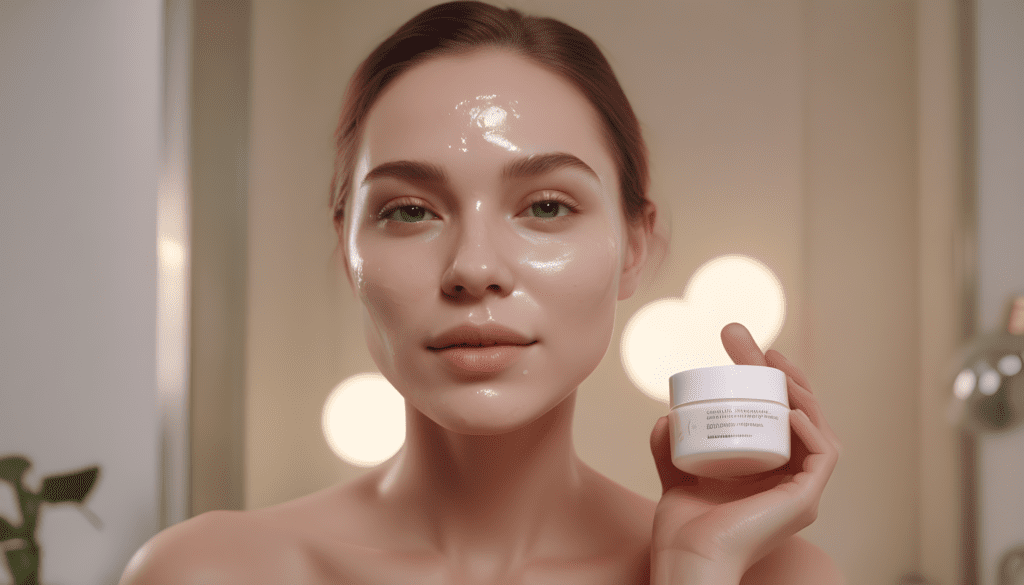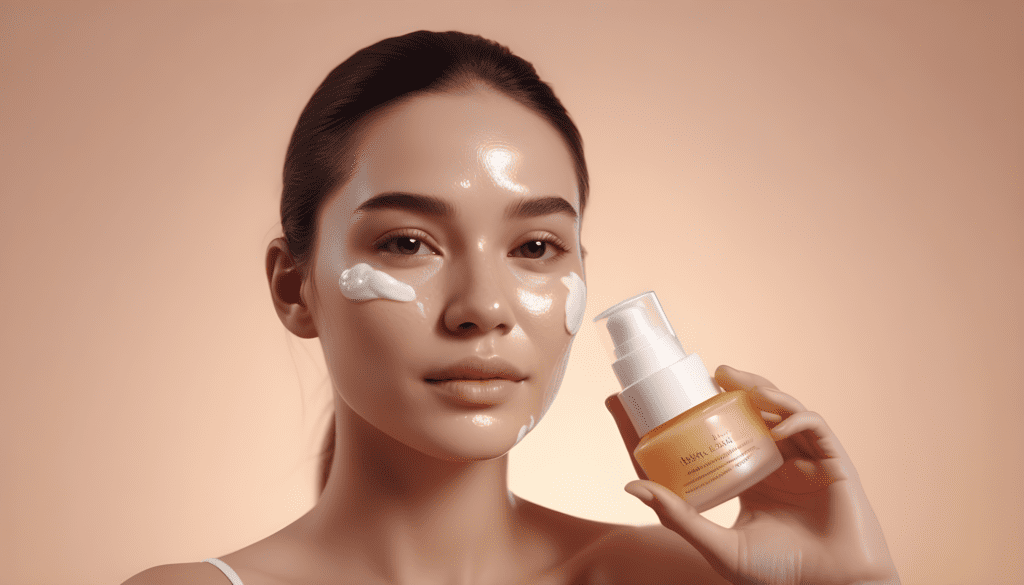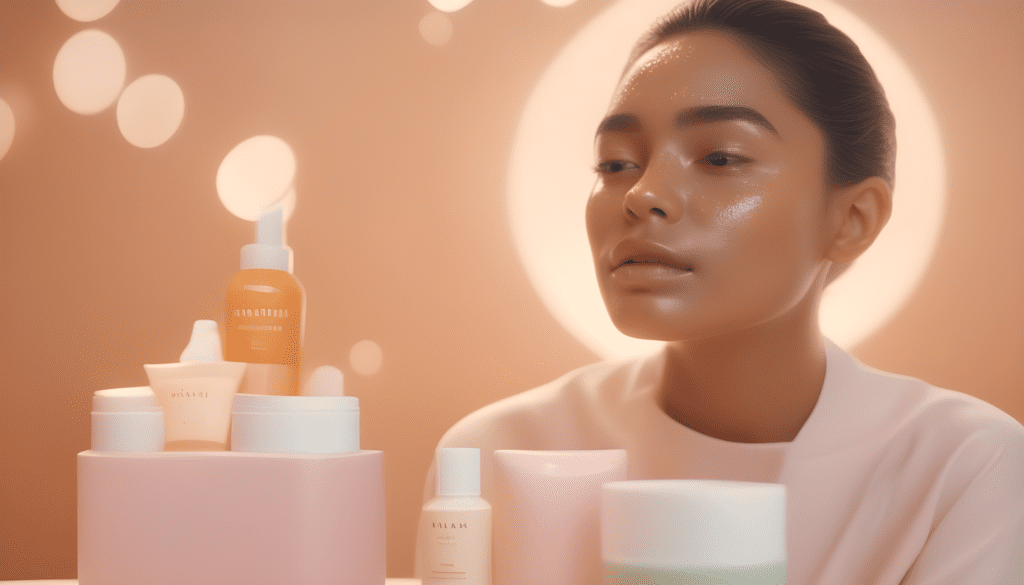Dealing with oily skin can be challenging, but with the right skincare routine, it’s possible to achieve a balanced and radiant complexion. Oily skin types tend to produce excess oil, which can lead to clogged pores, acne, and other skin concerns. However, by using the right products and techniques, you can effectively control oil production and maintain healthy skin.
In this section, we will explore the best skincare products and routines specifically designed for oily skin types. We will cover everything from cleansing to hydration and targeted treatments, as well as lifestyle tips to support your day-to-day skincare for oily skin. By the end of this section, you’ll have a better understanding of how to care for your oily skin and achieve the best results.
Table of Contents
Key Takeaways
- Effective skincare for oily skin can help control excess oil and promote a balanced complexion.
- Cleansing, exfoliation, hydration, targeted treatments, and sun protection are all essential for oily skin types.
- Makeup and lifestyle habits can also impact the health of oily skin.
- By using the right products and techniques, you can achieve a healthier, clearer complexion.
- Regular skincare routine is essential to maintain the health of oily skin.
Understanding Oily Skin
If you have oily skin, you may find it challenging to maintain a clear and healthy complexion. But understanding your skin type is the first step towards creating an effective skincare regimen.
Skincare for oily skin involves products and techniques that help regulate oil production, unclog pores, and prevent breakouts.
The Characteristics of Oily Skin
Oily skin is characterized by an overproduction of sebum or oil, which can lead to an oily or greasy appearance.
Additionally, oily skin tends to have larger pores, is more prone to acne breakouts, and can feel congested or heavy.
The Causes of Oily Skin
Several factors contribute to oily skin, including genetics, hormonal changes, and environmental factors.
During puberty, the body produces more androgens, which stimulate the sebaceous glands and increase oil production. Hormonal imbalances, such as those caused by pregnancy or menopause, can also lead to oily skin.
Environmental factors such as humidity, heat, and pollution can exacerbate oily skin.
How to Determine Your Skin Type
Not sure if you have oily skin? Here’s a simple test:
- Cleanse your face with a gentle cleanser and pat dry.
- Wait for an hour without applying any products or touching your face.
- Observe your skin in natural light.
If your skin looks shiny and feels greasy, you likely have oily skin.
Now that you have a better understanding of skincare for oily skin and its unique needs, you can seamlessly create a customized routine that promotes a healthy and balanced complexion.
Cleansing for Oily Skin
When it comes to oily skin, cleansing is a crucial step that should not be overlooked. The right cleanser can effectively remove excess oil, dirt, and impurities without stripping the skin’s natural moisture barrier. Look for a cleanser that is specifically designed for oily skin and has oil-absorbing properties. These are commonly known as oil control cleansers or oily skin cleansers.
Choosing the Right Oil Control Cleanser
Oil control cleansers typically contain ingredients like salicylic acid, glycolic acid, or benzoyl peroxide, which help to regulate oil production and prevent breakouts. However, it’s important to note that these ingredients can be harsh on the skin if overused. Therefore, it’s best to limit the use of these products to once or twice a day, depending on your skin’s needs.
When selecting an oil control cleanser, look for a formula that is gentle and non-drying. Avoid cleansers with added fragrances or alcohol, as they can irritate the skin and cause inflammation, leading to more oil production. Instead, opt for a gentle, pH-balanced formula that will leave your skin feeling clean, fresh, and balanced.

The Double Cleansing Method
If you have extremely oily skin or wear heavy makeup, the double cleansing method can help ensure a thorough cleanse. This method involves using two different cleansers: an oil-based cleanser followed by a water-based cleanser. The oil-based cleanser helps to break down and remove dirt, makeup, and excess oil, while the water-based cleanser removes any remaining impurities and unclogs pores.
Cleansing Technique for Oily Skin
When cleansing oily skin, it’s best to use lukewarm water, as hot water can strip the skin of its natural oils and cause irritation. Start by wetting your face with water and then applying a small amount of cleanser to your fingertips. Gently massage the cleanser onto your face in circular motions for about 30 seconds, paying extra attention to your forehead, nose, and chin (also known as the T-zone), which tend to be the oiliest areas. Rinse thoroughly with lukewarm water and pat your face dry with a clean towel.
Tip: Avoid washing your face more than twice a day, as this can lead to over-drying and cause your skin to produce even more oil.
By incorporating a suitable cleanser into your skincare for oily skin routine, you can effectively manage oily skin and achieve a healthy, balanced complexion.
Exfoliation for Oily Skin
Exfoliation is a critical part of any skincare routine, especially for those with oily skin. It helps to unclog pores, remove dead skin cells, and control excess oil production, ultimately leading to a brighter and healthier complexion. However, it’s essential to choose the right exfoliating products and techniques to avoid damaging the skin.
Types of Exfoliators
There are two main types of exfoliators – physical and chemical. Physical exfoliators use small particles to physically scrub away dead skin cells from the skin’s surface. On the other hand, chemical exfoliators use acids like alpha-hydroxy acids (AHAs) and beta-hydroxy acids (BHAs) to dissolve dead skin cells.
For oily skin, chemical exfoliators are a better choice as they penetrate deeply into the pores, removing excess oil and impurities. Popular chemical exfoliants for oily skin include salicylic acid, glycolic acid, and lactic acid. However, it’s crucial to start with a lower concentration and gradually increase as the skin adjusts to avoid irritation.
Best Exfoliating Products for Oily Skin
| Product | Description |
| The Ordinary AHA 30% + BHA 2% Peeling Solution | This chemical exfoliant contains a potent blend of AHAs and BHAs that effectively exfoliate the skin, unclog pores, and control oil production. |
| Paula’s Choice Skin Perfecting 2% BHA Liquid Exfoliant | Formulated with salicylic acid, this cult-favorite exfoliant penetrates deep into the pores, unclogging them and reducing blackheads and whiteheads. |
| Neutrogena Pore Refining Exfoliating Cleanser | This physical exfoliant contains small microbeads that gently remove dead skin cells and unclog pores without stripping the skin’s natural moisture. |
| Drunk Elephant T.L.C. Sukari Babyfacial | This mask contains a blend of AHA and BHA acids to exfoliate and resurface the skin while improving its texture and tone. |
While these exfoliating products are effective for oily skin, it’s crucial to use them in moderation and not over-exfoliate. Over-exfoliating can damage the skin’s natural barrier and cause redness and irritation. Experts recommend exfoliating once or twice a week, depending on your skin’s sensitivity and tolerance.
It’s also essential to follow up with a hydrating, oil-free moisturizer after exfoliation to soothe and replenish the skin.
Hydration for Oily Skin
It is a common myth that oily skin does not need hydration. In reality, hydration is crucial for maintaining the skin’s moisture balance and preventing oil overproduction. However, it is essential to choose the right type of moisturizer that does not add excess oil to the skin. The ideal moisturizer for oily skin should be oil-free, lightweight, and non-comedogenic.

Here are some tips for choosing the best moisturizer for oily skin:
- Look for oil-free formulas that do not clog pores.
- Choose lightweight textures that absorb quickly into the skin.
- Consider gel-based moisturizers that provide hydration without leaving a greasy residue.
When applying moisturizer, make sure to use a small amount and spread it evenly across the face. Excess moisturizer can lead to increased oil production, so it’s crucial to use a light hand. It may also be helpful to apply moisturizer while the skin is still damp after cleansing, as this can lock in moisture.
Best Oil-Free Moisturizers for Oily Skin
Here are some of the best oil-free moisturizers for oily skin:
| Product | Key Features |
| Neutrogena Hydro Boost Gel Cream | Oil-free gel moisturizer that provides intense hydration without leaving a greasy residue. Contains hyaluronic acid to help lock in moisture. |
| Cetaphil Dermacontrol Oil Control Moisturizer | Lightweight, oil-free moisturizer that mattifies oily skin and provides broad-spectrum SPF 30 sun protection. Contains micropearl technology to absorb excess oil. |
| La Roche-Posay Effaclar Mat Face Moisturizer | Oil-free moisturizer that helps regulate oil production and provides a matte finish. Contains sebulyse technology to absorb excess oil. |
Remember to choose a moisturizer that is suitable for your skin type and concerns. By adding hydration to your skincare routine, you can help control oil production and achieve a healthy, radiant complexion.
Targeted Treatments for Oily Skin
Oily skin, often notorious for its susceptibility to acne and breakouts, benefits significantly from a consistent skincare routine. Embracing a well-rounded approach not only aids in controlling oil production but also plays a crucial role in maintaining a clear complexion. When exploring effective treatments and serums tailored for skincare for oily skin, consider incorporating targeted solutions into your regimen.
Acne Spot Treatment
If you have oily skin, chances are you’ll encounter the occasional breakout. Combat pesky pimples with an acne spot treatment.
Tip: Look for ingredients like salicylic acid or benzoyl peroxide, which work to unclog pores and kill acne-causing bacteria.
Oil Control Serum
Using a specialized oil control serum can help regulate sebum production and prevent excess oil build-up.
Tip: Look for serums containing niacinamide or tea tree oil, which are known to have oil-regulating properties.
Charcoal Mask
Charcoal masks are excellent for oily skin types, as they can draw out impurities and excess oil from the skin.
Tip: Use a charcoal mask once a week for best results. Be sure to follow up with a lightweight, oil-free moisturizer to prevent over-drying.
Retinol Treatment
Retinol is a powerful anti-aging ingredient that also assists with acne control. It helps exfoliate dead skin cells, unclog pores, and promote cell turnover.
Tip: If you’re new to retinol, start with a low concentration and gradually increase usage over time to prevent irritation.
Chemical Peels
Chemical peels can help reduce oiliness and improve skin texture. They work by exfoliating the outermost layer of skin, revealing a brighter and smoother complexion.
Tip: Book a professional chemical peel treatment at a reputable salon or spa. Alternatively, consider a daily AHA or BHA exfoliating toner for similar benefits.
Sun Protection for Oily Skin
While the sun provides us with Vitamin D, overexposure can cause skin damage, premature aging, and skin cancer. This is why sun protection is crucial for all skin types, including oily skin. However, finding the right sunscreen can be a challenge for those with oily skin.
The best sunscreens for oily skin are those that are oil-free and have a lightweight texture that doesn’t leave a greasy residue. Look for products that offer at least SPF 30 to provide adequate protection against harmful UV rays.

Oil-free sunscreen is a sunscreen that is free from oil and other ingredients that can clog pores and cause breakouts. These sunscreens are also less likely to leave a greasy residue on the skin.
When applying sunscreen, it’s essential to use a sufficient amount to ensure adequate protection. As a general guide, use a shot glass (around two tablespoons) of sunscreen for the whole body and a nickel-sized amount for the face.
Apply sunscreen at least 30 minutes before sun exposure and reapply every two hours or immediately after swimming or sweating.
Choosing the Right Sunscreen
Here are some factors to consider when choosing a sunscreen for oily skin:
| Factor | Considerations |
| SPF | Choose a sunscreen with at least SPF 30 to provide adequate protection against harmful UV rays. |
| Texture | Look for sunscreens that have a lightweight texture and are non-greasy to avoid clogging pores and causing breakouts. |
| Ingredients | Choose a sunscreen with ingredients like zinc oxide or titanium dioxide, which are less likely to cause irritation and breakouts on oily skin. Avoid sunscreens with fragrances or alcohol, as they can dry out the skin. |
With the right sun protection, you can enjoy the outdoors without worrying about damaging your skin. Remember to reapply sunscreen every two hours and wear protective clothing like hats and long-sleeved shirts when possible.
Makeup Tips for Oily Skin
Makeup can be a challenge for those with oily skin. The key is to use products that are oil-free and long-lasting to keep your makeup looking fresh and matte all day. Here are some tips to help you achieve a flawless makeup look:
- Prep your skin with an oil-control primer. This will help control shine and keep your makeup in place.
- Use an oil-free foundation. Look for a formula that is specifically designed for oily skin and provides medium to full coverage.
- Set your foundation with a translucent powder. This will help keep your makeup in place and prevent it from transferring or melting off.
- Avoid cream or liquid-based products such as cream blushes and highlighters. These can cause your makeup to slide off and make your skin look greasy. Opt for powder-based products instead.
- Invest in a good quality oil-absorbing blotting paper. This is the best way to get rid of excess oil throughout the day without disrupting your makeup.
- Use a long-lasting setting spray to keep your makeup in place. This will help prevent your makeup from fading or melting off, especially during hot and humid weather.
Wondering how to remove make up from oily skin? check out this in depth guide!
Remember, the key to achieving a long-lasting, matte makeup look on oily skin is to use oil-free products and set your makeup with a translucent powder and setting spray.
Lifestyle Tips and Skincare for Oily Skin
Managing oily skin can be quite challenging, but with the right lifestyle habits, you can effectively reduce excess oil production and minimize breakouts. When it comes to skincare for oily skin, it’s not just about the products you use; it’s also essential to incorporate specific tips into your daily routine:
- Stick to a consistent skincare routine: Consistency is key when it comes to managing oily skin, and a thoughtful skincare routine plays a vital role. For optimal results, stick to a regular skincare routine that includes cleansing, exfoliating, and moisturizing twice a day to keep oil production in check. This approach ensures that your skincare for oily skin is both effective and sustainable over time.
- Avoid over-washing: While cleansing is crucial for oily skin, over-washing can strip your skin’s natural oils, leading to increased oil production. Wash your face twice a day and avoid harsh, drying products.
- Watch your diet: Certain foods, such as dairy and high-glycemic index foods, can exacerbate oily skin. Incorporate a diet rich in whole foods, fruits, and vegetables to support healthy skin.
- Stay hydrated: Drinking enough water helps maintain skin moisture and prevent excess oil production. Aim for at least eight glasses of water a day.
- Manage stress: Stress can trigger hormone imbalances that contribute to oily skin and breakouts. Incorporating stress-reducing practices such as meditation, yoga, or exercise can help keep skin clear and healthy.
Skincare for Oily Skin-The Perfect REgimen

It’s super important to take care of your skin, especially when it’s oily. You want to keep a good balance and prevent those annoying breakouts. That’s where a simple and strong routine for skincare for oily skin comes in handy. Think of it like a plan that helps your skin stay healthy! Doing things like washing your face and using products made for skincare for oily skin can make a big difference. Just follow these steps, and you’ll have a routine that keeps your skin feeling radiant and problem-free.
| Step | Product | Instructions |
| Cleanse | Oil control cleanser | Gently massage onto damp skin for 30 seconds, then rinse thoroughly with lukewarm water. |
| Exfoliate | Oily skin exfoliator | Apply to damp skin and gently massage in circular motions for 30-60 seconds. Rinse thoroughly with lukewarm water. |
| Moisturize | Oil-free moisturizer or lightweight moisturizer | Apply a dime-sized amount to clean skin, focusing on dry areas. Allow the moisturizer to absorb fully before applying makeup. |
| Treat | Acne treatment or oil control serum | Apply a small amount to areas prone to breakouts or excess oil production. |
| Sunscreen | Oil-free SPF | Apply a dime-sized amount to the face and neck daily. Reapply every two hours or as needed. |
By following these simple tips and establishing a consistent skincare routine, you can manage oily skin effectively and achieve a radiant, healthy complexion.
Conclusion
Looking after oily skin can be a challenging task, but it’s essential to maintain its health and appearance. By following a proper skincare regimen, you can manage excess oil production and avoid breakouts while maintaining a hydrated and glowing complexion.
Lifestyle Habits
In addition to skincare products, incorporating certain lifestyle habits can contribute significantly to managing oily skin. Eating a balanced diet rich in fruits and vegetables and avoiding processed foods can help regulate oil production. Regular exercise also helps to improve circulation and promote healthy skin.
Consistency is Key
Consistent skincare is key for managing oily skin. Use oil-control cleansers, exfoliants, and oil-free moisturizers regularly. Don’t forget daily application of lightweight, non-comedogenic sunscreen for sun protection. This ensures a well-rounded routine tailored for skincare for oily skin.
Makeup Tips
When applying makeup to oily skin, prime your face with an oil-control primer to reduce oil production and keep your makeup in place all day. Use oil-free and long-lasting foundations and concealers to prevent your makeup from sliding off your face. Finish off with a setting powder to control shine.
With the right skincare products and routines, and a few simple lifestyle habits, you can transform oily skin into a radiant and healthy-looking complexion.
FAQ (Skincare for Oily Skin)
What is the best skincare for oily skin?
The best skincare for oily skin includes oil control cleansers, exfoliating products, lightweight moisturizers, targeted treatments for acne, oil-free sunscreens, and long-lasting makeup formulated for oily skin.
What are the characteristics and concerns associated with oily skin?
Oily skin is characterized by excess sebum production, a shiny appearance, enlarged pores, and a higher likelihood of experiencing acne and breakouts.
What are the best cleansers for oily skin?
Oil control cleansers that effectively remove excess oil and impurities without stripping the skin’s natural moisture barrier are recommended for oily skin.
How can I exfoliate oily skin?
Exfoliation is crucial for oily skin to unclog pores and remove dead cells. Look for exfoliating products specifically formulated for oily skin and consider incorporating techniques such as gentle physical exfoliation or chemical exfoliation with ingredients like salicylic acid.
Do I still need to moisturize if I have oily skin?
Yes, oily skin still requires hydration. Look for oil-free moisturizers that help maintain moisture balance without adding excess oil to the skin.
Are there any treatments specifically for oily skin?
Yes, there are targeted treatments and serums available for oily skin that help regulate oil production and promote a clearer complexion.
Should I use sunscreen if I have oily skin?
Absolutely! Sun protection is essential for all skin types, including oily skin. Look for lightweight and non-comedogenic sunscreens that provide adequate protection without causing greasiness.
What makeup tips can help control oil on my skin?
To control oil on the skin, opt for makeup products specifically formulated for oily skin and consider using oil-absorbing primers, setting powders, and long-lasting formulas.
Are there any lifestyle tips to manage oily skin?
Yes, alongside skincare products, certain lifestyle habits can help manage oily skin. Incorporating a balanced diet, regular exercise, and avoiding excessive touching and picking of the face can support your skincare routine.



Leave a Reply